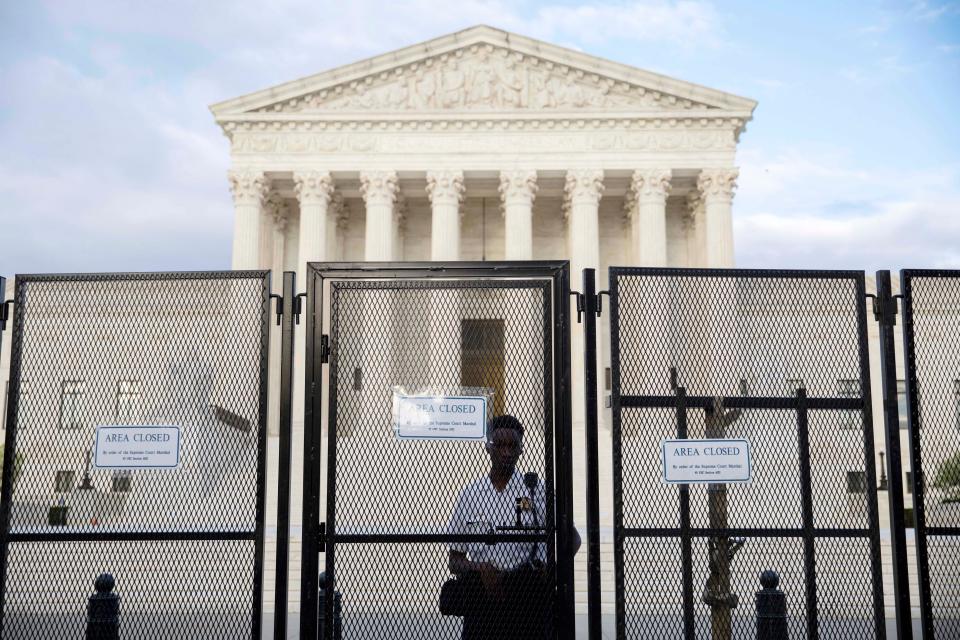Justice Alito's history of abortion in leaked draft opinion? It's debatable, experts say.
WASHINGTON – Associate Justice Samuel Alito's draft opinion in Mississippi's challenge to Roe v. Wade is reenergizing a brawl over the history of abortion in the United States – a debate almost as fraught as the one over the procedure itself.
Legal scholars and advocates have fought for decades about how states treated abortion when the 14th Amendment was ratified in 1868, guaranteeing states could not deprive Americans of "liberty" without due process of law. The framing of that history will be key as the justices deliberate over how Americans defined "liberty" 150 years ago.
Alito's draft, which makes the case for overturning the 1973 landmark decision legalizing abortion, has drawn fire from some historians who say he cherry-picked from the historical record and glossed over important context to conclude that "abortion had long been a crime in every single state" before the high court ruled in Roe v. Wade.
"Until the latter part of the 20th century, there was no support in American law for a constitutional right to obtain an abortion. Zero. None," Alito wrote in a opinion that was leaked to Politico this month and confirmed by the court as authentic. "Until a few years before Roe was handed down, no federal or state court had recognized such a right."
Crossover: How a Supreme Court case about pigs could impact the abortion debate
Whodunit?: Speculation swirls as Supreme Court launches probe into leaked draft
Explainer: What is the 14th Amendment and what does it have to do with Roe?
By the time the 14th Amendment was adopted, Alito wrote in his draft, three-quarters of states had made abortion a crime at any stage of pregnancy. Critics say that assertion overlooks a distinction many Americans made between early- and late-term abortions.
"Anytime you base arguments on tradition and history, one ought to recognize that there's no such thing as a history or a tradition," said Anna Grzymala-Busse, a political scientist at Stanford University who has studied religious politics. "Had he looked at the historiography, the picture that emerges is considerably more complicated."
Conservatives, including Alito, accuse those who support abortion rights of making ungrounded assumptions about the availability of the procedure and they argue the 7-2 Supreme Court majority in Roe v. Wade simply misread the history of the issue.

"The claim that somehow the right to have an abortion was a liberty enshrined in the 14th Amendment when it was ratified in 1868 just doesn't hold up if you understand the simple fact...that it was a crime in 1868," said Joseph Dellapenna, a former Villanova University law professor who wrote a brief in the abortion case cited by Alito.
"There were essentially no dissenting voices about that at that time," he said.
Critics of that argument, including the Biden administration, say women didn't have much of a voice to dissent with at the time. The 19th Amendment giving women the vote wasn't ratified until 1920 – more than five decades later. Dellapenna counters that some of the best-known suffragists opposed abortion – a point that is also heavily debated.
The Supreme Court is currently weighing a Mississippi ban on most abortions after 15 weeks of pregnancy, which is at odds with the standard set by the court's 1992 decision in Planned Parenthood v. Casey. A 5-4 majority ruled that Americans could have an abortion until a fetus is able to survive outside the womb – about 24 weeks.
A final decision on Mississippi's ban is expected this summer.
Historical analysis has long been a part of the abortion debate, and it was a major component of the majority opinion in Roe v. Wade. But the focus on history has become even more pronounced as the conservative legal movement has stressed originalism. That approach emphasizes the meaning of the words in the Constitution as the framers of the founding document would have understood them.
That sort of historical analysis was on display when the Supreme Court in 2008 struck down a Washington, D.C., prohibition on handguns. The majority ruled that the words of the Second Amendment, along with the history leading up to its writing, granted individual Americans a constitutional right to keep a gun at home.
But just as with abortion, the history of gun rights has been hotly contested.
History: Can New Yorkers carry guns? A 700-year-old law may inform decision
'Pirate ship': Justices Alito, Gorsuch battle over textualism in LGBTQ rights case
Both abortion rights advocates and those who oppose the procedure seem to agree that many states tightened their laws in the early- to mid-19th Century, though they differ sharply on the cause of that shift. By 1868, Alito wrote in the draft opinion, 28 out of 37 states had enacted laws that made abortion a crime – even early inpregnancy.
In a brief filed in the Mississippi case last year, the American Historical Association and the Organization of American Historians count the numbers slightly differently: They identify 11 states where abortion remained legal "before quickening," when the pregnant person can feel a fetus move. And in the remaining 26 states, they assert that seven imposed a lesser punishment for abortions performed early in a pregnancy.
"Even in states that criminalized abortion, convictions were rare," the groups wrote.
But even a relatively simple count of state laws isn't straightforward. That's because Dellapenna and others say groups who support abortion rights are misreading what was meant by "quickening" or "quick with child" in early laws. That term, they say, was interpreted by English courts and some state courts to refer to any stage of gestation.
Alito flicked at the disagreement in his draft opinion – and then quickly backed away from it.
"The exact meaning of ‘quickening' is subject to some debate," he wrote in a footnote. "We need not wade into this debate."
This article originally appeared on USA TODAY: Draft Supreme Court opinion animates debate over abortion history

